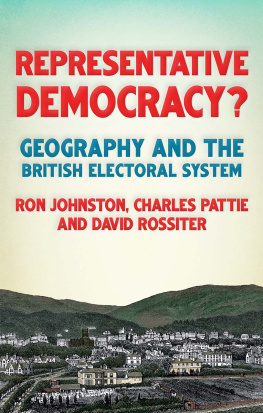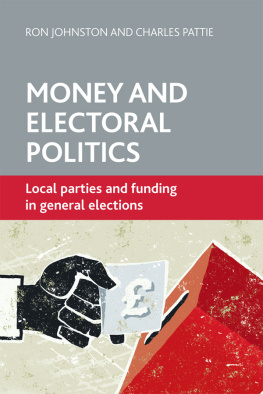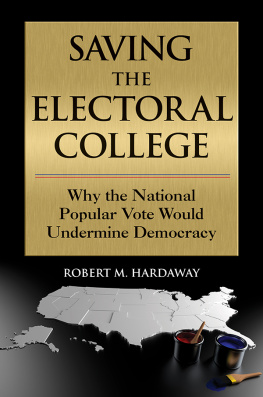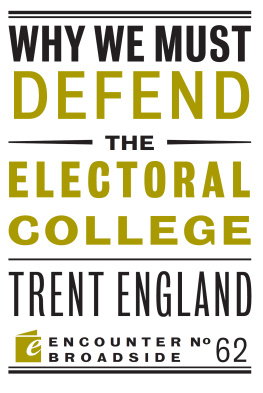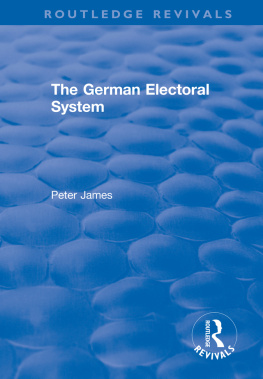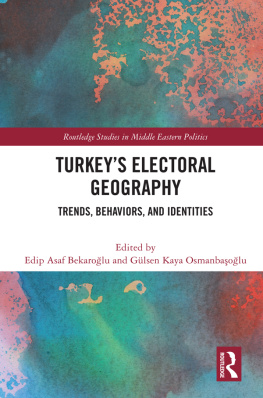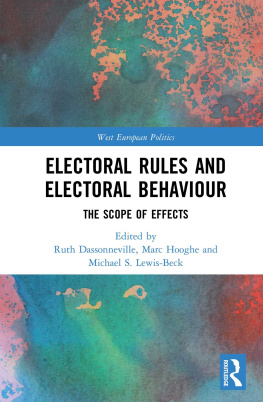ROUTLEDGE LIBRARY EDITIONS: POLITICAL GEOGRAPHY
Volume 7
DEVELOPMENTS IN ELECTORAL GEOGRAPHY
DEVELOPMENTS IN ELECTORAL GEOGRAPHY
Edited by
R.J. JOHNSTON, F.M. SHELLEY AND P.J. TAYLOR
First published in 1990
This edition first published in 2015
by Routledge
2 Park Square, Milton Park, Abingdon, Oxon, OX14 4RN
and by Routledge
711 Third Avenue, New York, NY 10017
Routledge is an imprint of the Taylor & Francis Group, an informa business
1990 R.J. Johnston, F.M. Shelley and P.J. Taylor
All rights reserved. No part of this book may be reprinted or reproduced or utilised in any form or by any electronic, mechanical, or other means, now known or hereafter invented, including photocopying and recording, or in any information storage or retrieval system, without permission in writing from the publishers.
Trademark notice: Product or corporate names may be trademarks or registered trademarks, and are used only for identification and explanation without intent to infringe.
British Library Cataloguing in Publication Data
A catalogue record for this book is available from the British Library
ISBN: 978-1-138-80830-0 (Set)
eISBN: 978-1-315-74725-5 (Set)
ISBN: 978-1-138-80991-8 (Volume 7)
eISBN: 978-1-315-74974-7 (Volume 7)
Publishers Note
The publisher has gone to great lengths to ensure the quality of this reprint but points out that some imperfections in the original copies may be apparent.
Disclaimer
The publisher has made every effort to trace copyright holders and would welcome correspondence from those they have been unable to trace.
Developments in Electoral Geography
edited by
R.J. JOHNSTON, F.M. SHELLEY,
and
P.J. TAYLOR
First published 1990
by Routledge
11 New Fetter Lane, London EC4P 4EE
Simultaneously published in the USA and Canada
by Routledge
a division of Routledge, Chapman and Hall, Inc.
29 West 35th Street, New York, NY 10001
1990 RJ. Johnston, F.M. Shelley and P.J. Taylor
Typeset by LaserScript Limited, Mitcham, Surrey
Printed and bound in Great Britain by
Billings & Sons Limited, Worcester
All rights reserved. No part of this book may be reprinted or reproduced or utilized in any form or by any electronic, mechanical, or other means, now known or hereafter invented, including photocopying and recording, or in any information storage or retrieval system, without permission in writing from the publishers
British Library Cataloguing in Publication Data
Developments in electoral geography.
1. Politics. Geographical factors
I. Johnston, R. J. (Ronald John, 1941) II. Shelley, F. M. 1947 III. Taylor, Peter J. (Peter James, 1944)
320.12
ISBN 0415041333
Library of Congress Cataloging in Publication Data
Developments in electoral geography / edited by R.J. Johnston, F.M. Shelley, and P.J. Taylor.
p. cm.
Bibliography: p.
Includes index.
ISBN 0415041333
1. Elections. 2. Geography, Political. I. Johnston, R. J. (Ronald John) II. Shelley, F. M., 1947 . III. Taylor, P. J., 1944 . IV Title: Electoral geography.
JF 1001.D47 1990
324dc20
8910562
CIP
Contents
Fred M. Shelley, R. J. Johnston, and Peter J. Taylor
.
John A. Agnew
David R. Reynolds
N. P. Passchier and H. H. van der Wusten
John OLoughlin and A.J. Parker
Rex Honey and J. Ross Barnett
Monroe Eagles
R. J. Johnston
A. Lijphart
Rebecca S. Roberts, Frances M. Ufkes, and Fred M. Shelley
David C. Hodge and Lynn A. Staeheli
Diane Whalley
Bernard Grofman, Robert Griffin and Amihai Glazer
Nancy Ettlinger
Alexander B. Murphy
Gordon L. Clark
Peter J. Taylor
R. J. Johnston Department of Geography, University of Sheffield, Sheffield S10 2TN, UK.
F. M. Shelley Department of Geography, University of Southern California, University Park, Los Angeles, CA 90089-0063, USA.
P. J. Taylor Department of Geography, University of Newcastle upon Tyne, Newcastle upon Tyne, NE1 7RU, UK.
J. A. Agnew Department of Geography, Syracuse University, Syracuse, NY 13244, USA
N. P. Passchier and H. H. van der Wusten Department of Geography, University of Amsterdam, Jodenbreestraat 23, 1011 NH Amsterdam, The Netherlands.
J. OLoughlin Department of Geography, University of Colorado, Boulder, CO 80309-0260, USA.
A. J. Parker Department of Geography, University College Dublin, Belfield, Dublin 4, Irish Republic.
R. Honey Department of Geography, University of Iowa, Iowa City, IA 52242, USA.
J. R. Barnett Department of Geography, University of Canterbury, Private Bag, Christchurch, New Zealand.
M. Eagles Department of Political Science, Saint Marys University, Halifax, Nova Scotia B3H 3C3, Canada.
A. Lijphart Department of Political Science, University of California San Diego, La Jolla, CA 92093-0060, USA.
R. S. Roberts and F. M. Ufkes Department of Geography, University of Iowa, Iowa City, IA 52242, USA
D. C. Hodge and L. A. Staeheli Department of Geography, University of Washington, Seattle, WA 98195, USA.
D. Whalley Department of Geography and Anthropology, University of North Texas, Denton, TX 76203-5277.
B. Grofman and A. Glazer School of Social Sciences, University of California Irvine, Irvine, CA 92717, USA.
R. Griffin Department of Political Science, Stanford University, Stanford, CA 94305, USA.
N. Ettlinger Department of Geography, Ohio State University, Columbus, OH 43210, USA.
A. B. Murphy Department of Geography, University of Oregon, Eugene, OR 94703, USA.
G. L. Clark School of Urban and Public Affairs, Carnegie-Mellon University, Pittsburgh, PA 15213, USA.
Fred M. Shelley, R. J. Johnston and Peter J. Taylor
Electoral geography, or the systematic spatial analysis of elections, has a long intellectual history. The mapping of voting statistics has provided important insights into the operation of modern polities. But such contributions have been rare. Electoral geography has been a victim of that most debilitating of all intellectual diseases rampant empiricism. Many electoral geography studies have consisted of mere descriptions of the spatial pattern of the vote in a particular election with little or no concern for wider issues. Hence the social theory underlying the analysis is left implicit as a status quo model of society. This has generated a very uncritical body of knowledge under the label electoral geography.
It was a generally felt dissatisfaction with this intellectual legacy that provided the stimulus for organizing a conference on electoral geography and social theory in Los Angeles in April 1988. The purpose was to slay the empiricist dragon once and for all and the results of this exercise are before you. What is very clear is that electoral geography is in a state of flux. In this it reflects the current pluralism of human geography as a whole. There is a sense of transition from empiricism but it is by no means obvious where we are going. A diversified product is to be welcomed as long as we avoid an eclectic blurring of theory. At Los Angeles the focus on social theory was manifest in two ways. First some papers provided critical evaluations of traditional theories in recent electoral contexts. Second, some papers attempted to look outwards to alternative social theories in which to situate electoral geography. Between them these approaches combine continuity and innovation to provide electoral geography with a fresh platform for researches in the 1990s.


